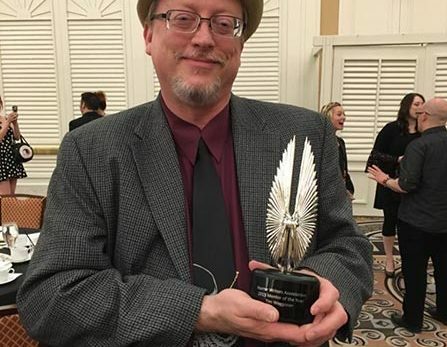Halloween is just around the corner and for fans of the horror genre at the downtown campus, Sinclair’s English Department lined up the perfect event to get their thrills in early. Professor Tim Waggoner, winner of four Bram Stoker awards, has made a name for giving readers an endless supply of spine-tingling reasons to fear the dark over the decades. In commemoration of National Day On Writing, he spoke to a crowd full of students and faculty to share the secrets to his success.
In his presentation, Waggoner offered important advice about writing horror and insight into the ways fear is used to serve-up chills in books, short stories, and onscreen. Horror, he explained, can be categorized as fear of the unknown.
“The thing about the ‘unknown’ is that it is a very good principle for horror, because once something is known it is no longer scary. Think about all the things in your lifetime that were unknown and seemed terrifying that now are just everyday things to you,” he said.
Waggoner said, “No matter what type of horror story you are doing, its important that you maintain an element of mystery. Because that’s the ‘unknown’. You want readers to have that experience too, not just your characters.”
According to Waggoner, horror stories do not have to be supernatural by any means. Horror can be realistic so long as it violates the characters’ perception of reality.
“This violation usually shakes them and their world to their core. In horror, reality is not benign, it is not orderly, it is chaotic, uncaring or malevolent because that’s where you get your story. This holds true for any type of horror,” said Waggoner.
Speaking on the famed heroes journey formula, Waggoner shared his own version that applies to horror protagonists. Dubbed by the man himself ‘The Poor Bastard’s Descent Into Hell’, the professor considers it a great way to outline stories in the genre.
He said, “The ‘poor bastard’ is just somebody normal because if you have a hero like Indian a Jones he has a great amount of stuff to draw on as opposed to people like us. Regular folks don’t know how to use weapons, have survival training, or any of that sort of stuff. That is where the horror comes from.”
“It’s the difference between the movies Alien and Aliens. One is a horror movie, the other action adventure. They both have the same threat but the stories are different,” he said.
The ‘descent into hell’, he explained, was the situation the protagonist is in that steadily gets worse with time. It could be anything from spiritual, physical, emotional, or any combination of internal and external crises.
Waggoner said, “The poor bastard may escape hell, or he may not get out and is eternally damned. Maybe they escape but are severely scarred or perhaps they are transformed by their situation in the end. Maybe they carry hell with them or bring others to it. In some stories they might even become the devil themselves. That is what makes the ending in horror different from the typical Heroes Journey.”
Readers looking for more of Waggoner’s expert advice can pick up the author’s award-winning book ‘Writing in the Dark’ or its sequel from their retailer of choice.
Ismael David Mujahid, Managing Editor

